Americans and Asia in 2020: Three Things to Know
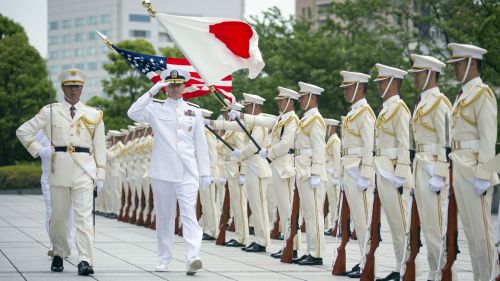
With the US election a week away, here are three key things you need to know about the American public's views on Asia in 2020.
The 2020 presidential election in the United States will, as many commentators are fond of saying now, be the most consequential election in most Americans' living memory. That's certainly true for the future direction of US policy in Asia, and US allies are watching closely (and nervously) as election day in the US draws near.
With the US election a week away, here are three key things you need to know about the American public’s views on the region.
1. Views of China take a tumble – but Americans have never loved their allies more
Matching the decline in US-China relations, American views of China have turned sharply more negative. As measured on a 0-100 scale where 0 is very unfavorable and 100 is very favorable, American opinion of China has hit an all-time low of 32—lower than any point in Council polling dating back to 1978. Democrats (37) have a somewhat warmer view than Republicans (25), but both have fallen dramatically and are all-time lows. But feelings for major American allies in the region—South Korea and Japan—are at all-time highs. On the same scale, Americans give South Korea an average of 60, and Japan an average of 65.
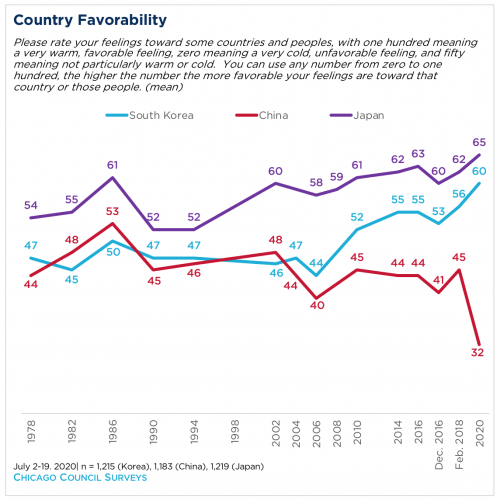
That favorable feeling also extends into the policy arena. Americans increasingly say the United States should prioritize building up strong relations with traditional allies like South Korea and Japan (77%) rather than building a new partnership with China (17%). This preference for building strong alliances in Asia has steadily risen since 2012, when the public was more closely split on where US foreign policy in Asia should go. This trend has also been a bipartisan one, with support for alliance-building in Asia steadily growing across party lines; today, similar majorities of Democrats (77%), Republicans (80%), and Independents (77%) all back a policy focused on building up US alliances in Asia.
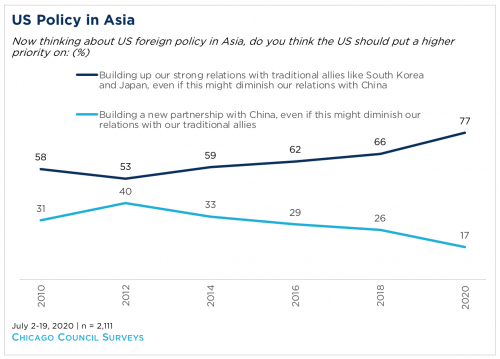
2. Americans are split on China policy
It's not just that Americans like China less than they used to, and like their allies more. The public is also shifting on the basic approach the US should take with regards to the rise of China's power. For over a decade, dating back to 2006, Americans consistently felt that the United States should undertake friendly cooperation and engagement with China rather than actively working to limit the growth of China’s power. Today, Americans are now divided over which of those policies to pursue, with half favoring cooperation and engagement (47%) and half saying the US should work to limit the growth of China’s power (49%). This division reflects a split between partisan groups. Six in ten Democrats (60%) favor cooperation and engagement, while two-thirds of Republicans (64%) want to limit China's rise.
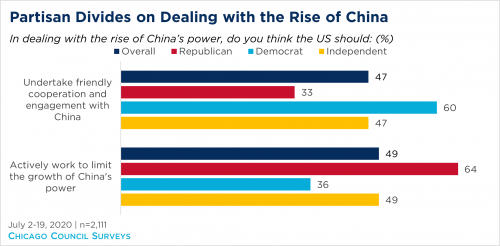
While Democrats have more recently grown more negative on China, they still endorse a policy of cooperation and engagement with Beijing and oppose a broader decoupling of the American and Chinese economies. Republicans, on the other hand, are more closely aligned with the Trump Administration’s hardline stances on China, seeing China as a critical threat to the country and favoring a range of policies aimed at limiting the economic, technological, and personal exchanges between the two countries.
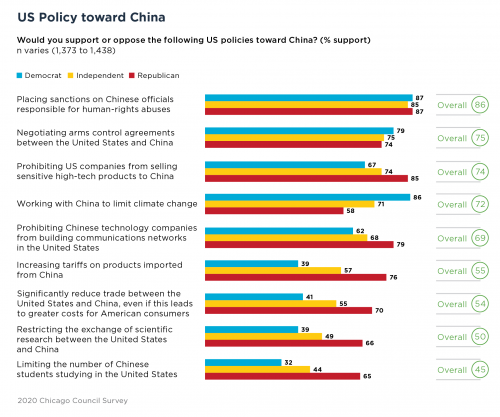
3. For Americans, not all trade partners are alike
Despite the shock of the pandemic, American esteem for international trade remains high, and higher than it was before President Trump’s election. Majorities of Americans continue to see international trade as mostly good for the US economy, for consumers like them, for creating jobs in the US—and especially for US relations with other countries.
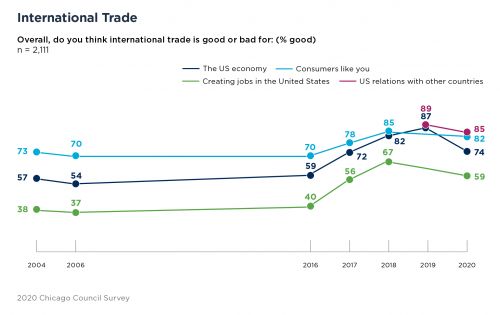
But not all countries stack up equally when it comes to trade for the American public. Matching their favorable views of South Korea and Japan, Americans see both countries as fair trade partners for the United States. China, by contrast is seen as an unfair trade partner, with three-quarters of Americans (73%) saying China practices unfair trade, compared to two in ten (22%) who say it practices fair trade. The view that China is an unfair trading partner has been a consistent majority in the 21st century, and one that has steadily grown in popularity over that period.
By contrast, views of South Korea and Japan as trade partners have grown more favorable over the same period, and particularly since 2017. American views of Japan as a trade partner, in particular, have undergone a radical shift over the past thirty years. In the 1990s, majorities of Americans saw Japan as an unfair trade partner for the US, even as they viewed the country favorably overall.
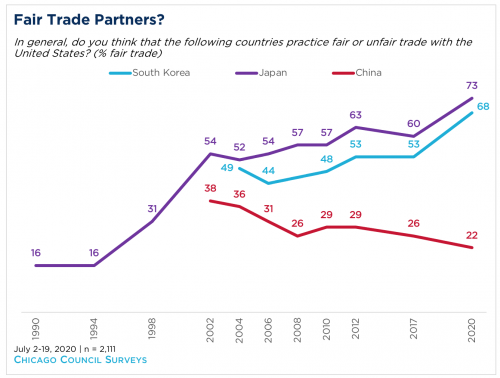
In the aftermath of the election, American policy in the region could take distinctly different paths depending on the victor. But either way, the President, and Congress, will have to take into account these public attitudes when shaping the future of US policy in Asia.
Related Research

